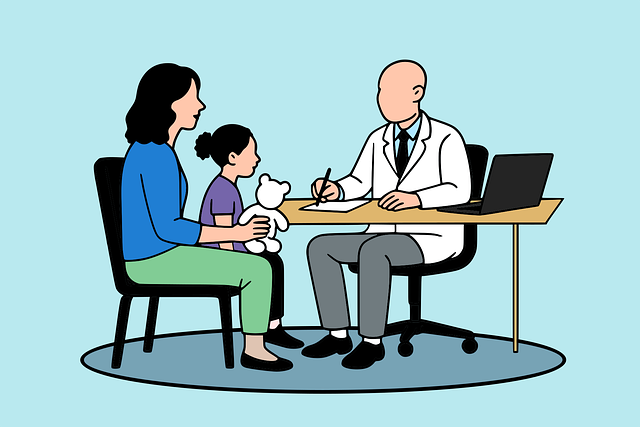Family dynamics profoundly impact addiction recovery, with underlying issues like codependency and communication breakdowns often fueling substance use disorders. This article explores the intricate relationship between family relationships and behavioral healthcare, highlighting the crucial role of family therapy in addressing enabling behaviors and fostering strong support systems. Through understanding these dynamics, we can enhance long-term treatment success for individuals seeking recovery.
Learn about the specific challenges – from codependency to communication gaps – and discover evidence-based strategies to improve family engagement in addiction recovery.
- Understanding the Interplay Between Family Dynamics and Addiction
- The Impact of Codependency on Substance Use Disorders
- Strategies for Improving Communication in Struggling Families
- Overcoming Enabling Behaviors: A Step Towards Recovery
- Enhancing Family Support for Long-Term Addiction Treatment Success
Understanding the Interplay Between Family Dynamics and Addiction

Addiction within a family unit is a complex issue that stems from intricate interactions between its members. Behavioral healthcare professionals recognize that understanding these dynamics is crucial in addressing addiction effectively. Family relationships, communication patterns, and unspoken rules can significantly influence an individual’s path to recovery. For instance, codependency, where one person becomes overly reliant on another for emotional support, may contribute to enabling behaviors that perpetuate substance abuse.
The interconnection between family dynamics and addiction is particularly evident in cases of teen addiction and family support or when addressing the challenges faced by families with children diagnosed with ADHD. In these scenarios, recognizing unhealthy patterns and promoting open communication becomes vital. By educating families about the cyclical nature of addiction and its impact on mental health recovery, behavioral healthcare providers can empower them to break free from destructive behaviors. This holistic approach ensures that family members are equipped to provide the necessary support, fostering an environment conducive to long-term healing and positive behavior change.
The Impact of Codependency on Substance Use Disorders

Codependency within families can significantly contribute to the development and persistence of substance use disorders. When one member struggles with addiction, other family members often adopt unhealthy patterns of behavior as a means of coping or enabling. This dynamic creates an interdependent relationship where the individual with the disorder and their codependent relatives are locked in a cycle of dependency. For instance, a parent with a substance use disorder might neglect their responsibilities, leading to children stepping into the role of caregivers, developing codependency in the process.
This complex behavioral healthcare issue within families can manifest differently. In some cases, codependents may inadvertently support their loved one’s addiction by providing financial assistance or covering up their behavior. Such enabling behaviors perpetuate the individual’s struggle with substance abuse and hinder their motivation to seek treatment. Recognizing these patterns is crucial for initiating family healing, especially when considering issues like Adhd Children and substance use or Teen Addiction and family support, as early intervention can lead to more positive outcomes for all involved.
Strategies for Improving Communication in Struggling Families

Effective communication is a cornerstone in improving family dynamics, especially when addressing issues like addiction. Struggling families often experience silences, misunderstandings, and arguments due to unspoken tensions related to substance use disorders. To foster better communication, it’s essential to create safe spaces where everyone feels heard and respected. Encouraging open dialogue, active listening, and expressing emotions without judgment can help break down barriers. Family members should learn to recognize triggers for both the addict and other family members, enabling them to navigate conversations with empathy and understanding.
Behavioral healthcare techniques, such as cognitive-behavioral therapy (CBT), can equip families with tools to manage conflicts and strengthen their support network. By identifying unhealthy patterns, like codependency where one person enables another’s addiction, families can begin to unravel these issues. Addressing co-occurring disorders like ADHD in children or anxiety in family members is crucial for overall mental health recovery. Through education and therapy, families can learn to communicate effectively, set boundaries, and offer encouragement without enabling harmful behaviors, ultimately fostering a healthier and more supportive environment for everyone involved.
Overcoming Enabling Behaviors: A Step Towards Recovery

Overcoming enabling behaviors is a significant step in the journey towards recovery within behavioral healthcare. Often, families unintentionally perpetuate cycles of addiction by engaging in behaviors that provide temporary relief or avoid dealing with underlying issues. Enabling can manifest as financial support, ignoring harmful patterns, or justifying substance use to cope with stress. Recognizing these patterns and taking steps to disrupt them is crucial for both the recovering individual and the family’s well-being.
Family healing involves addressing these enabling behaviors through open communication and seeking professional guidance. By learning healthier coping mechanisms, families can provide a supportive environment without inadvertently fueling addiction. This process fosters a new dynamic where trust is rebuilt, boundaries are set, and everyone involved is equipped to navigate challenges together—a key element in supporting teen addiction and promoting long-term recovery for all members of the family unit.
Enhancing Family Support for Long-Term Addiction Treatment Success

Strengthening family support structures is a cornerstone for long-term addiction treatment success, particularly in behavioral healthcare settings. Family mental health professionals play a pivotal role in fostering an environment that promotes healing and recovery. Through specialized therapy sessions, they help families understand the complex dynamics of substance use disorders, addressing issues like codependency and enabling behaviors that may have perpetuated the cycle of addiction. By improving communication breakdowns, these professionals empower family members to provide sustainable support without inadvertently hindering their loved one’s progress.
Integrating knowledge about conditions such as ADHD children and substance use into family therapy sessions is crucial. This holistic approach recognizes that addiction often intersects with other mental health challenges within the family unit. By targeting these co-occurring disorders, family healing becomes a comprehensive process, addressing both the immediate needs of the individual struggling with addiction and the broader emotional well-being of the entire family system.

